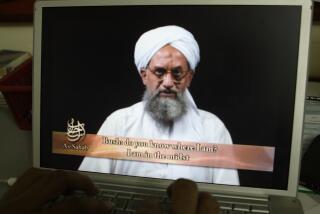Anti-Terrorism Drive Idling
- Share via
UNITED NATIONS — More than six months after the Security Council launched its global campaign against terrorism, 50 countries have failed to respond to its demand that all U.N. member states submit their plans to participate in the fight, and diplomats here have been unable to reach even tentative agreement on exactly what terrorism is.
On Monday, Western diplomats who are spearheading the counter-terrorism drive said the council is making “significant progress” in securing cooperation from most of the 189 nations represented here.
So far, however, the committee charged with implementing the program has had only a limited impact on the financing and mobility of global terrorist networks, British diplomats acknowledged.
Jeremy Greenstock, the British ambassador who heads the committee, told the council that 143 nations had provided the reports on anti-terrorism policies that were requested shortly after Sept. 11. The deadline for the reports was the end of last year, but the council has no direct enforcement powers.
The council’s aim is a kind of “world audit,” Jean-David Levitte, the French ambassador to the United Nations, said Monday, with experts examining anti-terrorism provisions in statute books and banking transactions and immigration records in all U.N. member states. The findings of these anti-terrorism auditors, however, will not be made public.
The council’s anti-terrorism directives have targeted only groups and individuals said to be linked to Al Qaeda. Largely as the result of direct U.S. action or pressure, international banks have frozen about $100 million in accounts held by individuals, charities or businesses allegedly tied to Osama bin Laden’s terrorist organization.
Sweden, Sudan and other U.N. members not on the council have objected to its reliance on secret Western intelligence reports in identifying alleged Al Qaeda operatives, contending that legitimate entrepreneurs may have been unfairly penalized. But council members say they have been convinced that the intelligence reports are accurate.
The counter-terrorism committee has reviewed and responded to 62 of the 143 reports it received from U.N. member states and four observers and expects to complete the remainder before June, Greenstock said. On Monday, the United States and other member nations urged the committee to actively pursue the 50 countries that have not yet responded to the council’s questionnaire on local anti-terrorism laws and practices.
But sanctions or other measures against non-responding countries appear unlikely, diplomats say. “The lack of compliance may be due more to a lack of resources than a lack of political will,” suggested Spain’s U.N. ambassador, Inocencio Arias, speaking to the council on behalf of the European Union.
And no nation has publicly defied the committee, while the list of countries that supplied reports includes Iraq, Iran, North Korea, Cuba and Syria--all accused by Washington of harboring or supporting terrorists.
After all the reports are reviewed, the committee will move on to the more politically problematic phase of its work: evaluating whether U.N. member states are in fact taking the anti-terrorism actions they say they are taking, a process that some diplomats say could stretch into 2003 or beyond.
The U.N. General Assembly, meanwhile, stymied by a deep rift between the Western powers and leading developing nations, has quietly suspended its quest for a consensus definition of terrorism. Such a definition is a prerequisite for a long-delayed international convention that would give the U.N. efforts legal teeth by criminalizing terrorist activity anywhere in the world.
The United States, backed by most European nations, says the convention should not apply to any acts of violence against civilians committed by the military forces of recognized states--a provision fought by Arab states and others that insist that “state terrorism” should also be penalized.
For the moment, Greenstock said, the Security Council will consider terrorism to include “any act that all 15 council members believe to be an act of terrorism.”
More to Read
Sign up for Essential California
The most important California stories and recommendations in your inbox every morning.
You may occasionally receive promotional content from the Los Angeles Times.











